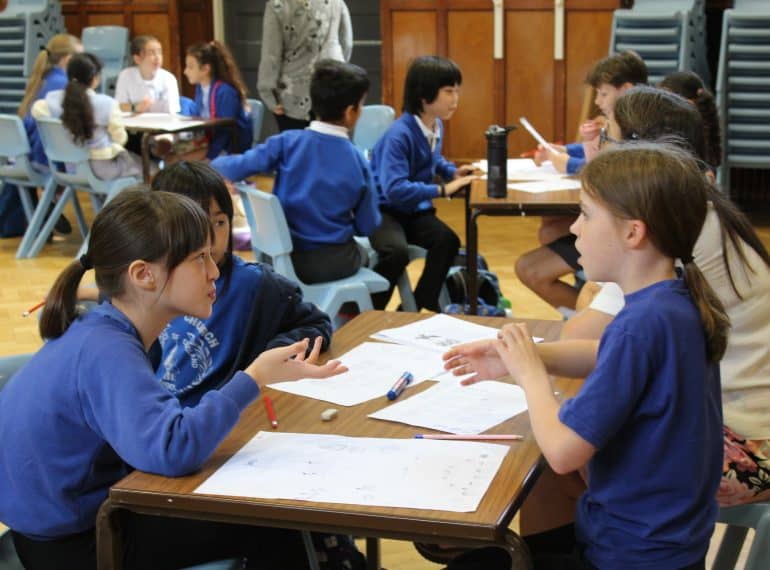
QE expanded its series of popular challenges for local primary school children this year, adding a humanities day to the programme.
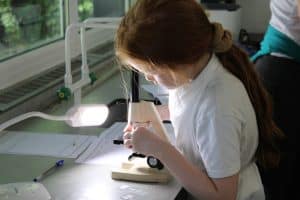 The events, which are part of QE’s partnerships work with the local community, are aimed at giving Year 5 girls and boys an early taste of secondary school education.
The events, which are part of QE’s partnerships work with the local community, are aimed at giving Year 5 girls and boys an early taste of secondary school education.
Headmaster Neil Enright said: “We are pleased to support local primary schools in this way.
“I know that our staff and pupils involved in running these enrichment activities greatly enjoy the opportunity to meet the visiting children.”
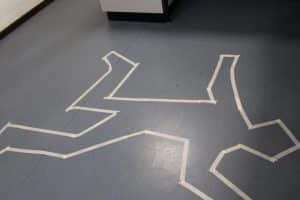 The first of the three days was the ever-popular Primary Forensics Workshop. The visitors were tasked with completing a number of experiments and analyses to work out who had murdered the Headmaster!
The first of the three days was the ever-popular Primary Forensics Workshop. The visitors were tasked with completing a number of experiments and analyses to work out who had murdered the Headmaster!
There were stations where the children could undertake: hair and fibre analysis using a microscope; fingerprint analysis, and blood spatter analysis (with a blood substitute).
The pupils worked to solve the ‘crime’, using the evidence they collected to build a case, while also weighing up the respective motives of the suspects.
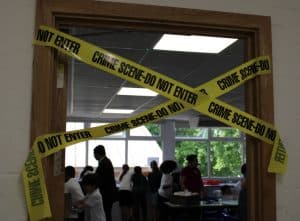 Boys from Year 12 helped staff run this workshop, engaging with the children at each station.
Boys from Year 12 helped staff run this workshop, engaging with the children at each station.
In the Maths and English Challenge, the girls and boys had to solve a series of games and puzzles that ranged from a cross-number round to a session looking at composing and performing poetry.
There was a focus on teamwork and collaboration. Each team had the support of a QE Year 7 pupil.
Special plaudits went to Foulds School pupils, who achieved a near-clean sweep of the prizes, having impressed across the various disciplines on the day.
The new humanities day hosted by the History, Geography and Economics departments comprised two separate activities.
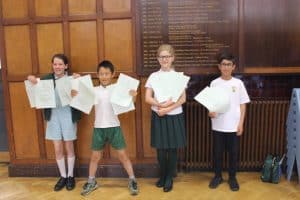 Firstly, teams were given the challenge of designing a castle on paper. They had to base their design on a certain set of criteria and follow a budget, requiring them to decide which features they wanted to prioritise.
Firstly, teams were given the challenge of designing a castle on paper. They had to base their design on a certain set of criteria and follow a budget, requiring them to decide which features they wanted to prioritise.
They then faced a number of scenarios, presenting both challenges and opportunities for their fortifications. Could their castle and kingdom survive?
“This was a way of exploring history and strategy in a fun and engaging way,” said Mr Enright. “The Year 5 pupils also had to adapt their plans as the scenarios unfolded, which meant teams had to communicate well and quickly make decisions.”
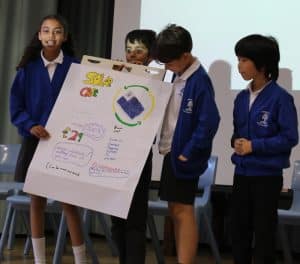 There was then a Sustainability Challenge run jointly by Geography and Economics. The children had to work in groups and devise a sustainable product. They designed their product, chose a logo and decided on their target market. Then each group presented to the other children in attendance. Among the ideas generated were: a mobile phone where the case is a solar panel and charges the phone, and a ‘plastic’ bottle where the bottle itself is biodegradable.
There was then a Sustainability Challenge run jointly by Geography and Economics. The children had to work in groups and devise a sustainable product. They designed their product, chose a logo and decided on their target market. Then each group presented to the other children in attendance. Among the ideas generated were: a mobile phone where the case is a solar panel and charges the phone, and a ‘plastic’ bottle where the bottle itself is biodegradable.
“Our staff were really impressed with the confidence shown by the children in their presentations and by the creativity they brought to bear in designing their products,” said the Headmaster.
Participating Barnet primary schools this year included: Underhill, Whitings Hill, Christchurch, and Foulds.

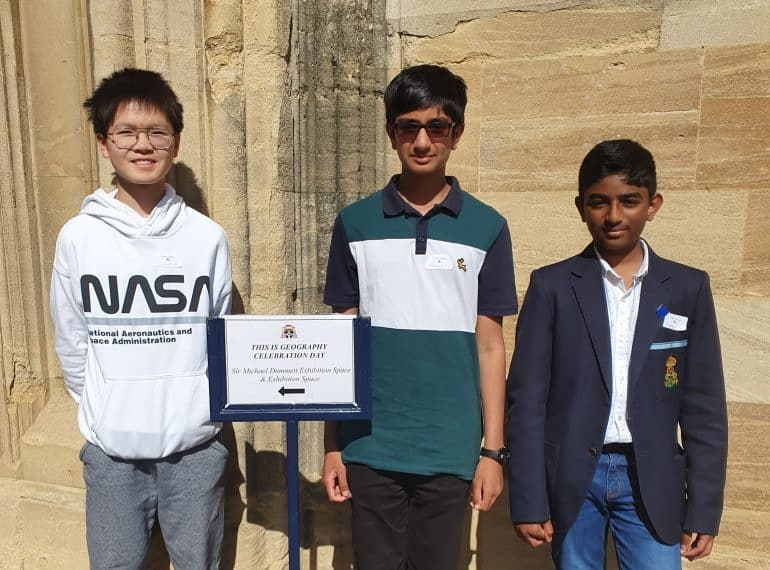
 Zhuoer Chen, of Year 9, and Sarang Nair, of Year 7, were among just ten finalists nationwide.
Zhuoer Chen, of Year 9, and Sarang Nair, of Year 7, were among just ten finalists nationwide.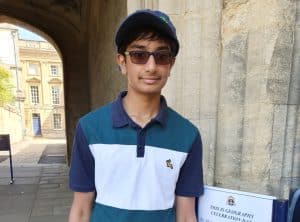 The competition, which is part of Christ Church’s outreach work, was open to all UK state school pupils in Years 7–10. Entrants had to submit a video 2–5 minutes long on a geographical issue or phenomenon that was local to them.
The competition, which is part of Christ Church’s outreach work, was open to all UK state school pupils in Years 7–10. Entrants had to submit a video 2–5 minutes long on a geographical issue or phenomenon that was local to them. The video compared average yearly temperatures at Greenwich weather station with those at Calgary and found they were 11.35C higher.
The video compared average yearly temperatures at Greenwich weather station with those at Calgary and found they were 11.35C higher.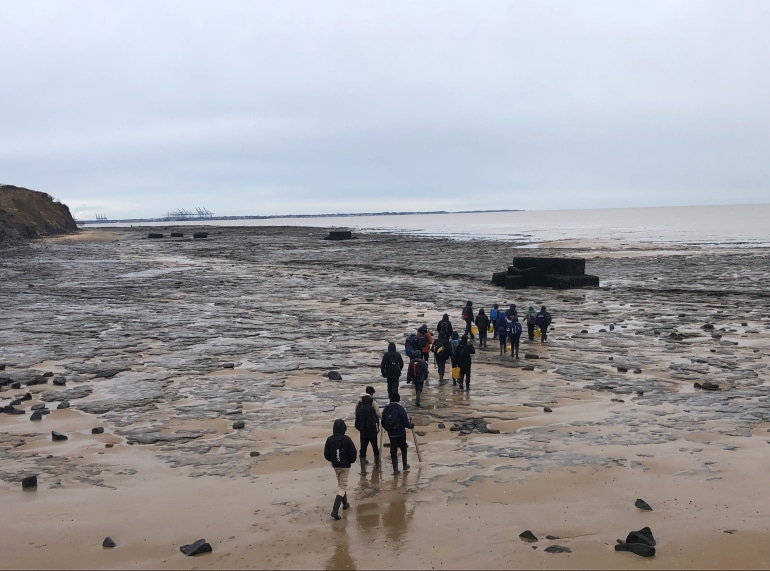
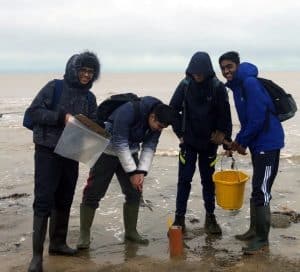 The 20 Year 12 geographers were able to inspect two World War II pillboxes that had fallen off the cliff at Walton-on-the-Naze and are now exposed by the sea at low tide.
The 20 Year 12 geographers were able to inspect two World War II pillboxes that had fallen off the cliff at Walton-on-the-Naze and are now exposed by the sea at low tide.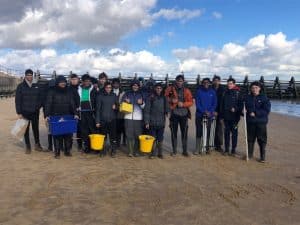 The party stayed in the Grade I-listed Flatford Mill. Today owned by the National Trust and leased to the Field Studies Council, the mill was owned by successive generations of the Constable family and was the subject of one of John Constable’s most famous paintings, completed in 1816.
The party stayed in the Grade I-listed Flatford Mill. Today owned by the National Trust and leased to the Field Studies Council, the mill was owned by successive generations of the Constable family and was the subject of one of John Constable’s most famous paintings, completed in 1816.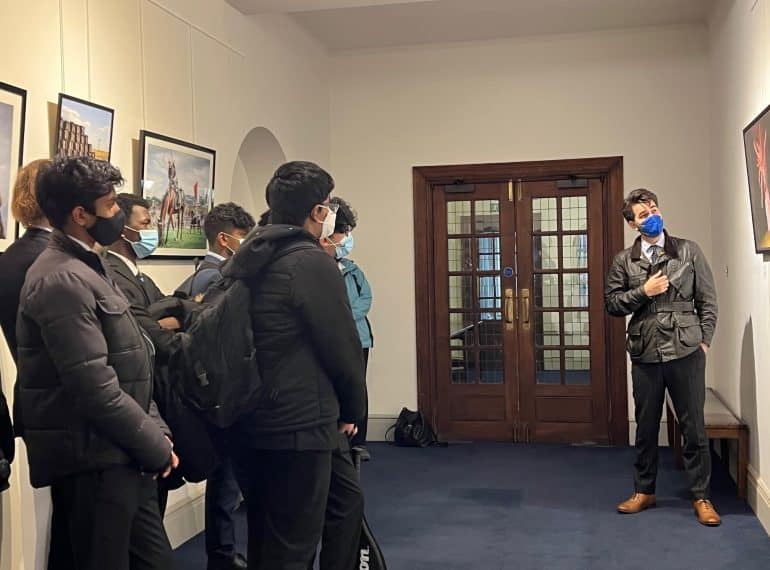
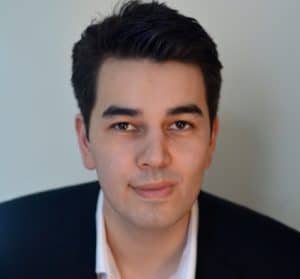 Featuring photography and a number of essays, the exhibition, which marks the tenth anniversary of the nuclear disaster and the earthquake and tsunami that precipitated it, is being held at the Royal Geographical Society in London. The earthquake and tsunami killed more than 15,000 and triggered a triple meltdown at the power station, forcing 200,000 people from their homes.
Featuring photography and a number of essays, the exhibition, which marks the tenth anniversary of the nuclear disaster and the earthquake and tsunami that precipitated it, is being held at the Royal Geographical Society in London. The earthquake and tsunami killed more than 15,000 and triggered a triple meltdown at the power station, forcing 200,000 people from their homes. The exhibition, entitled Picturing the Invisible, sees his research interests coming together with his longstanding engagement with the London art scene: while in the Sixth Form at QE, he took part in in the Royal Academy’s attRAct programme and in the Louis Vuitton Young Arts Program; he has also been an Event Manager at the OPEN Ealing community art gallery.
The exhibition, entitled Picturing the Invisible, sees his research interests coming together with his longstanding engagement with the London art scene: while in the Sixth Form at QE, he took part in in the Royal Academy’s attRAct programme and in the Louis Vuitton Young Arts Program; he has also been an Event Manager at the OPEN Ealing community art gallery.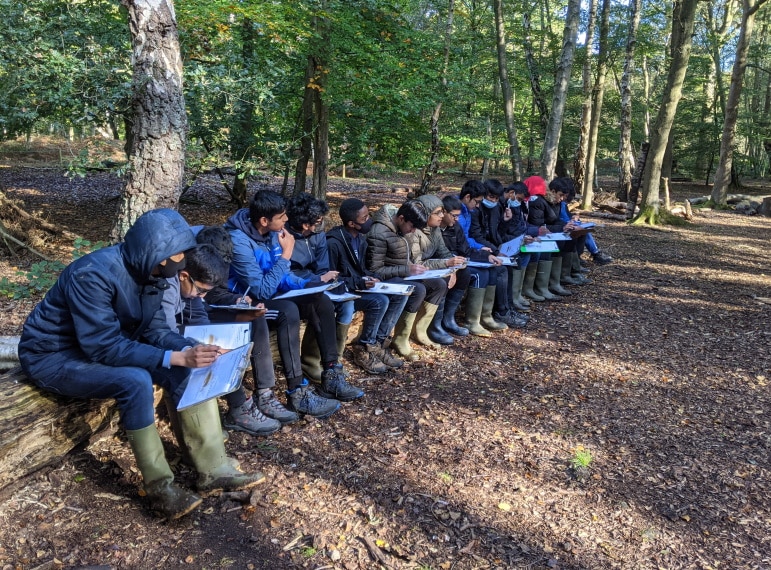
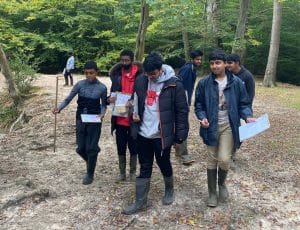 On their Human Geography trip, A-level students investigated gentrification in Wandsworth, where they met residents only too willing to share their views on how their area had changed.
On their Human Geography trip, A-level students investigated gentrification in Wandsworth, where they met residents only too willing to share their views on how their area had changed.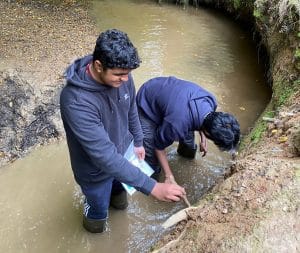 The field trip helped to consolidate boys’ understanding of rivers, which they had previously studied in a unit titled Physical Landscapes of the UK.
The field trip helped to consolidate boys’ understanding of rivers, which they had previously studied in a unit titled Physical Landscapes of the UK.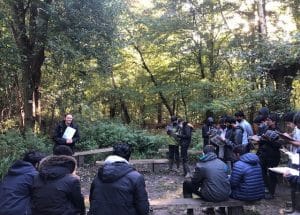 More recently, this month’s visit by Year 12 and 13 pupils to south London had as its goal exploration of the question: To what extent has Northcote ward undergone the process of gentrification? The visit was for part of a unit of study for the Edexcel A-level course entitled Regenerating Places, under which the sixth-formers are looking at the London boroughs of Wandsworth and Newham.
More recently, this month’s visit by Year 12 and 13 pupils to south London had as its goal exploration of the question: To what extent has Northcote ward undergone the process of gentrification? The visit was for part of a unit of study for the Edexcel A-level course entitled Regenerating Places, under which the sixth-formers are looking at the London boroughs of Wandsworth and Newham.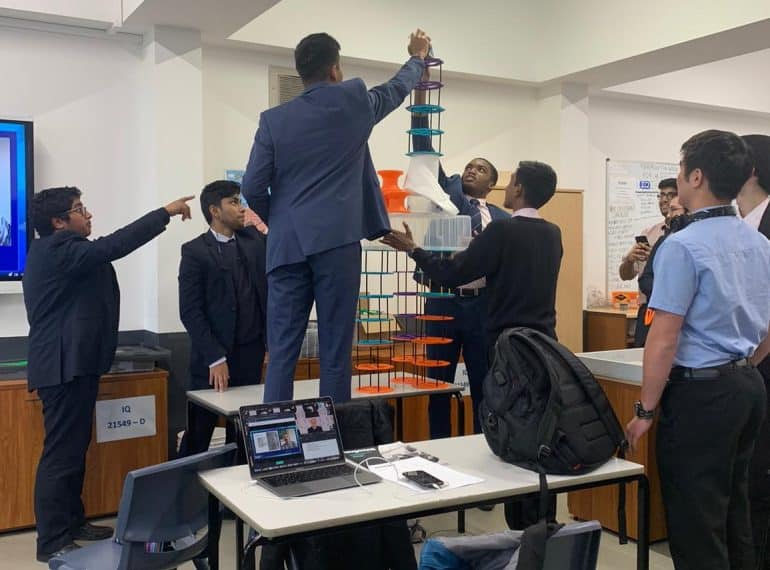
 Sixth-formers have already enjoyed stimulating day-long sessions on Medicine in Action, Chemistry in Action, Product Design in Action and Geography in Action, with a similar event for Biology due to take place in December.
Sixth-formers have already enjoyed stimulating day-long sessions on Medicine in Action, Chemistry in Action, Product Design in Action and Geography in Action, with a similar event for Biology due to take place in December.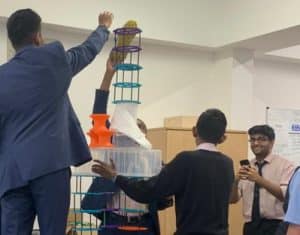 The Resourcefulness and design lecture, delivered by Kingston University Senior Lecturer Pascal Anson, stimulated a practical activity, pictured. “Here we see some examples of structures which were resourcefully developed by the students using VEX IQ and EDR Robotics game elements – great thinking on their feet!” added Mr Noonan.
The Resourcefulness and design lecture, delivered by Kingston University Senior Lecturer Pascal Anson, stimulated a practical activity, pictured. “Here we see some examples of structures which were resourcefully developed by the students using VEX IQ and EDR Robotics game elements – great thinking on their feet!” added Mr Noonan.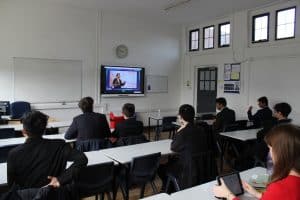 The Geography lectures were similarly wide-ranging. One talk, entitled Lessons in sustainability: An explorer’s tale, was by Jason Lewis, the first person to circumnavigate the earth without using motors or sails. Another featured academic Martin Evans, from the University of Manchester, speaking on Landscape Systems in the Anthropocene. And Emily Parry, Head of Geography, highlighted lectures on water insecurity and on how COVID-19 has impacted the Pacific Islands.
The Geography lectures were similarly wide-ranging. One talk, entitled Lessons in sustainability: An explorer’s tale, was by Jason Lewis, the first person to circumnavigate the earth without using motors or sails. Another featured academic Martin Evans, from the University of Manchester, speaking on Landscape Systems in the Anthropocene. And Emily Parry, Head of Geography, highlighted lectures on water insecurity and on how COVID-19 has impacted the Pacific Islands.